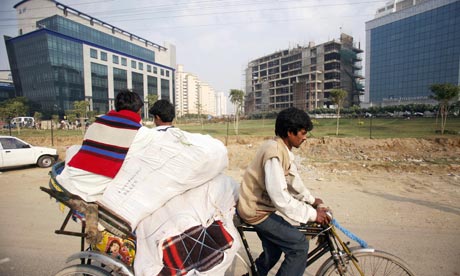Suzanne Moore in The Guardian

After the election, Obama told his daughters to carry on: ‘You don’t start worrying about apocalypse.’ Photograph: Rex/Shutterstock
A friend posts a picture of a baby. A beautiful baby. A child is brought into the world, this world, and I like it on Facebook because I like it in real life. If anything can be an unreservedly good thing it is a baby. But no ... someone else says to me, while airily discussing how terrible everything is: “I don’t know why anyone would have a child now.” As though any child was ever born of reason. I wonder at their mental state, but soon read that a war between the superpowers is likely. The doom and gloom begins to get to me. There is no sealant against the dread, the constant drip of the talk of end times.
I stay up into the small hours watching the footage of triumphant white nationalists sieg-heiling with excited hesitancy. My dreams are contaminated – at the edge of them, Trump roams the Black Lodge from Twin Peaks. But then I wake up and think: “Enough.” Enough of this competitive hopelessness.
Loss is loss. Our side has taken some heavy hits, the bad guys are in charge. Some take solace in the fact that the bad guys don’t know what they are doing: Farage, Trump, Johnson, Ukip donor Arron Banks, wear their ignorance as a badge of pride. One of the “liberal” values that has been overturned is apparently basic respect for knowledge. Wilful ignorance and inadequacy is now lauded as authenticity.
However, the biggest casualty for my generation is the idea that progress is linear. Things really would get better and better, we said; the world would somehow by itself become more open, equal, tolerant, as though everything would evolve in our own self-image. Long before Brexit or the US election, it was clear that this was not the case. I have often written about the way younger generations have had more and more stripped away from them: access to education, jobs and housing. Things have not been getting better and they know that inequality has solidified. Materially, they are suffering, but culturally and demographically the resistance to authoritarian populism, or whatever we want to call this movement of men old before their time, will come from the young. It will come also from the many for whom racism or sexism in society is nothing new.
Resistance can’t come personally or politically from the abject pessimism that prevails now. Of course, anger, despair, denial are all stages of grief, and the joys of nihilism are infinite. I am relieved that we are all going to die in a solar flare, anyway, but until then pessimism replayed as easy cynicism and inertia is not going to get us anywhere. The relentless wallowing in every detail of Trump or Farage’s infinite idiocy is drowning, not waving. The oft-repeated idea that history is a loop and that this is a replay of the1930s induces nothing but terror. Nothing is a foregone conclusion. That is why we learn history.
I am not asking for false optimism here, but a way to exist in the world that does not lead to feelings of absolute powerlessness. A mass retreat into the internal, small sphere of the domestic, the redecoration of one’s own safe space, is understandable, but so much of what has happened has been just this abandonment of any shared or civic space. It is absolutely to the advantage of these far-right scaremongers that we stay in our little boxes, fearing “the streets”, fearing difference, seeing danger everywhere.
Thinking for ourselves is, to use a bad word, empowering. It also demands that we give up some of the ridiculous binaries of the left. The choice between class politics and identity politics is a false one. All politics is identity politics. It is clear that economic and cultural marginalisation intertwine and that they often produce a rejection of basic modernity. Economic anxiety manifests in a longing for a time when everything was in its place and certain. But the energy of youth disrupts this immediately, as many young people are born into a modernity that does not accept that everything is fixed, whether that is sexuality or a job for life. Telling them: “We are all doomed” says something about the passivity of my generation, not theirs.
The historian and activist Howard Zinn said in his autobiography, You Can’t Be Neutral on a Moving Train: “Pessimism becomes a self-fulfilling prophesy: it reproduces by crippling our willingness to act.”
Indeed. Campaigning for reproductive rights isn’t something that suddenly has to be done because of Trump. It always has to be done. LGBT people did not “win”. The great fault line of race has been exposed, but it was never just theoretical. The idea that any of these struggles were over could be maintained only if you were not involved in them.
After the election, Obama told his daughters to carry on: “You don’t get into a foetal position about it. You don’t start worrying about apocalypse. You say: ‘OK, where are the places where I can push to keep it moving forward.’”
Where can you push to keep it moving forward? Locally? Globally? Get out of that foetal position. Look at some cats online if it helps. We render those in power even more powerful if we act as though everything is a done deal. Take back control.
A friend posts a picture of a baby. A beautiful baby. A child is brought into the world, this world, and I like it on Facebook because I like it in real life. If anything can be an unreservedly good thing it is a baby. But no ... someone else says to me, while airily discussing how terrible everything is: “I don’t know why anyone would have a child now.” As though any child was ever born of reason. I wonder at their mental state, but soon read that a war between the superpowers is likely. The doom and gloom begins to get to me. There is no sealant against the dread, the constant drip of the talk of end times.
I stay up into the small hours watching the footage of triumphant white nationalists sieg-heiling with excited hesitancy. My dreams are contaminated – at the edge of them, Trump roams the Black Lodge from Twin Peaks. But then I wake up and think: “Enough.” Enough of this competitive hopelessness.
Loss is loss. Our side has taken some heavy hits, the bad guys are in charge. Some take solace in the fact that the bad guys don’t know what they are doing: Farage, Trump, Johnson, Ukip donor Arron Banks, wear their ignorance as a badge of pride. One of the “liberal” values that has been overturned is apparently basic respect for knowledge. Wilful ignorance and inadequacy is now lauded as authenticity.
However, the biggest casualty for my generation is the idea that progress is linear. Things really would get better and better, we said; the world would somehow by itself become more open, equal, tolerant, as though everything would evolve in our own self-image. Long before Brexit or the US election, it was clear that this was not the case. I have often written about the way younger generations have had more and more stripped away from them: access to education, jobs and housing. Things have not been getting better and they know that inequality has solidified. Materially, they are suffering, but culturally and demographically the resistance to authoritarian populism, or whatever we want to call this movement of men old before their time, will come from the young. It will come also from the many for whom racism or sexism in society is nothing new.
Resistance can’t come personally or politically from the abject pessimism that prevails now. Of course, anger, despair, denial are all stages of grief, and the joys of nihilism are infinite. I am relieved that we are all going to die in a solar flare, anyway, but until then pessimism replayed as easy cynicism and inertia is not going to get us anywhere. The relentless wallowing in every detail of Trump or Farage’s infinite idiocy is drowning, not waving. The oft-repeated idea that history is a loop and that this is a replay of the1930s induces nothing but terror. Nothing is a foregone conclusion. That is why we learn history.
I am not asking for false optimism here, but a way to exist in the world that does not lead to feelings of absolute powerlessness. A mass retreat into the internal, small sphere of the domestic, the redecoration of one’s own safe space, is understandable, but so much of what has happened has been just this abandonment of any shared or civic space. It is absolutely to the advantage of these far-right scaremongers that we stay in our little boxes, fearing “the streets”, fearing difference, seeing danger everywhere.
Thinking for ourselves is, to use a bad word, empowering. It also demands that we give up some of the ridiculous binaries of the left. The choice between class politics and identity politics is a false one. All politics is identity politics. It is clear that economic and cultural marginalisation intertwine and that they often produce a rejection of basic modernity. Economic anxiety manifests in a longing for a time when everything was in its place and certain. But the energy of youth disrupts this immediately, as many young people are born into a modernity that does not accept that everything is fixed, whether that is sexuality or a job for life. Telling them: “We are all doomed” says something about the passivity of my generation, not theirs.
The historian and activist Howard Zinn said in his autobiography, You Can’t Be Neutral on a Moving Train: “Pessimism becomes a self-fulfilling prophesy: it reproduces by crippling our willingness to act.”
Indeed. Campaigning for reproductive rights isn’t something that suddenly has to be done because of Trump. It always has to be done. LGBT people did not “win”. The great fault line of race has been exposed, but it was never just theoretical. The idea that any of these struggles were over could be maintained only if you were not involved in them.
After the election, Obama told his daughters to carry on: “You don’t get into a foetal position about it. You don’t start worrying about apocalypse. You say: ‘OK, where are the places where I can push to keep it moving forward.’”
Where can you push to keep it moving forward? Locally? Globally? Get out of that foetal position. Look at some cats online if it helps. We render those in power even more powerful if we act as though everything is a done deal. Take back control.

